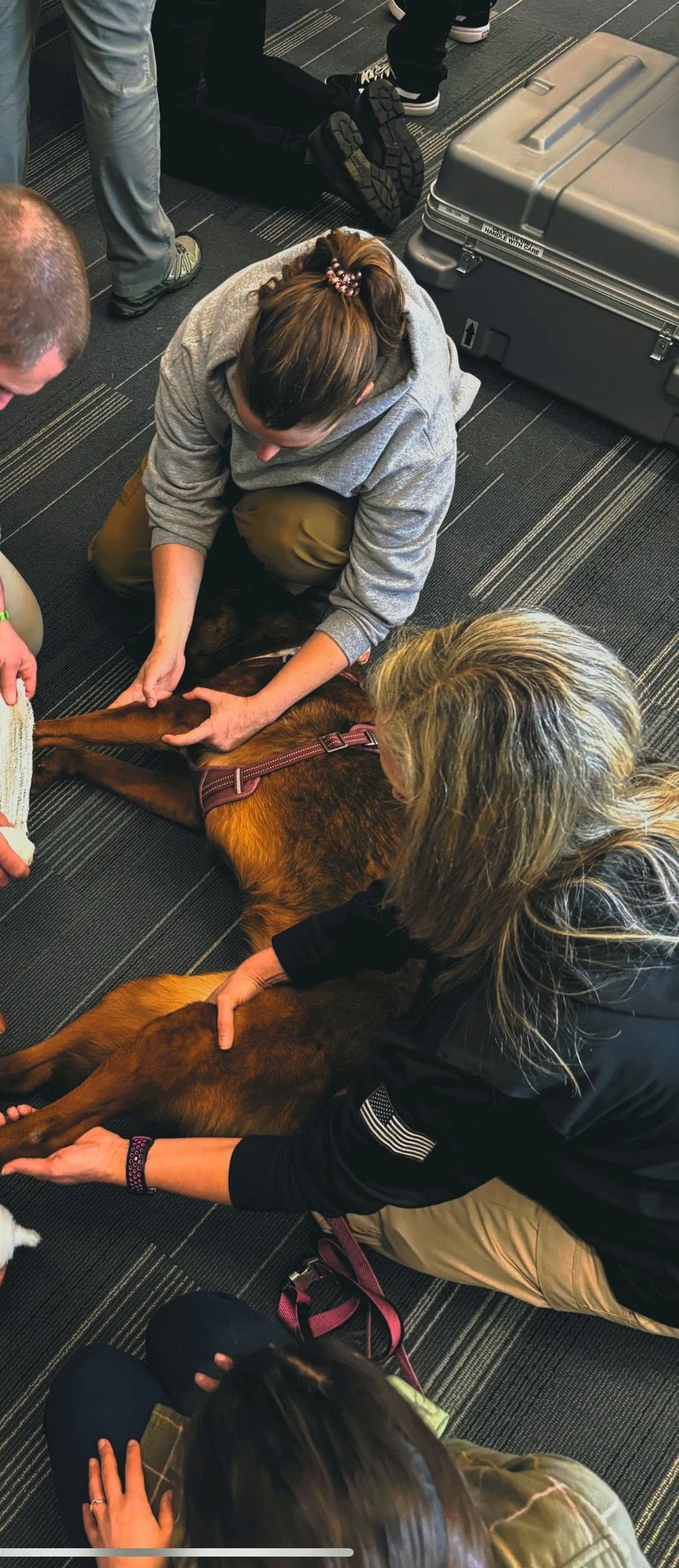
Class Information
ALS - Advanced Life Saving
ALS is intended for emergency medical personnel and/or those who have already taken our BLS class and are seeking to enhance their technical skills. We introduce additional topics and hands-on emergency techniques that enable you to provide even more effective medical care for your K9 partners. This class assumes scenarios in which there is access to field first aid kits, oxygen support, and some medical supplies. The style of this course is more heavily laboratory-based, and previous foundational knowledge is required to gain the most utility out of the taught skillset.
Topics include providing oxygen support, advanced CPR (including bag-mask breathing and intubation), choking emergencies, advanced airway techniques, needle decompressions, intravenous catheter placement, and discussion of advanced medications and fluid therapy.
Like the BLS curriculum, many of the skills taught in this course can be applied across disciplines. However, the topics presented can be modified or added to in a way that best serves what you need.
Ideal class size: 16-20 attendees
Maximum class size: 30 attendees
BLS - Basic Life Saving
BLS introduces our entry-level curriculum through an interactive format designed to enhance learning experiences for students. This class emphasizes the development of basic assessment skills with live dogs serving as subjects. Foundational anatomy and physical exam skills are followed by instruction on field-based emergency trauma care. An additional overview on other common canine emergencies prepares handlers to recognize and deal with non-traumatic but critical scenarios that may affect their dogs. Participants absorb didactic knowledge in a lecture-based setting, then apply what they have learned during our laboratory sessions. This approach equips students with the ability to identify and prevent potential injuries and illnesses at an early stage, promoting better outcomes for K9 partners.
Content includes recognition of canine behavior patterns that may indicate illness, assessment of vital signs, techniques for restraint and muzzling, proper positioning of a K9 for different emergency scenarios, field bandaging and wound-packing strategies for bleeding penetrating wounds, and basic life support CPR. Additional topics covered include managing heat-stroke, gastric dilatation volvulus (i.e. “bloat”), recognition of signs of drug intoxication, allergic reactions, and other common medical emergencies.
Although much of the core knowledge applies across disciplines, the programming of this class is flexible as we recognize there are many different jobs K9s have in the field. If there is a topic you would like to see added or subtracted from this curriculum, we are happy to tailor the program to your needs.
Ideal class size: 20-30 attendees
Maximum class size: 40 attendees
Below are some essential topics covered in our classes. Topics marked with an asterisk (*) are covered during our ALS Class sessions. These subjects are crucial for a comprehensive understanding of our curriculum and are thoroughly reviewed to ensure a well-rounded educational experience for all participants.
Cardiopulmonary Resuscitation (CPR) - artificial respirations and chest compressions - Research shows that starting CPR early outside of hospitals improves the likelihood of return of spontaneous circulation and full recovery. Recognizing the need and knowing canine CPR procedures will enable rescuers to optimize the chances of survival for these patients.
GDV/Bloat - Addresses common misconceptions as well as preventative measures. Discussions you can have with your K9’s Primary Vet as well as well as signs to watch for at home or on duty with your K9 Partner.
Heat-Related Illness/Injury- Focuses on the recognition and treatment of heat stroke and other heat-induced conditions. It emphasizes the importance of early detection and the application of cooling methods to prevent severe organ damage.
Bleeding Control - Covers techniques for managing hemorrhages, including wound packing and the application of tourniquets (TQ). Regular human tourniquets are not suitable for use on canines due to anatomical differences, prompting the need for specialized equipment or techniques.
Airway Management * - Procedures for ensuring airways are not obstructed during critical moments, such as intubation.
Respiration Awareness - Covers respiratory abnormalities
Field Medicine/Chemical Restraint *- Removing the complexity of dosage calculations by providing straightforward guidelines, ensuring that animals receive the correct therapeutic interventions without the stress of mathematical errors.
Fluid Management - This reviews the importance of maintaining proper hydration and managing fluid replacement in scenarios of dehydration, and blood loss, highlighting the critical aspect of fluid balance for Working Dogs.
IV Placement * - explains the techniques for establishing intravenous (IV) access, which are vital for the administration of medications and fluids in emergency situations.
Toxicity Preparedness - Provides guidelines on how to respond to the ingestion of toxic substances, outlining steps to mitigate the Toxins impact and the importance of swift veterinary intervention.
Snake Bite - Pre hospital medical care and the importance of certain actions for higher recovery chances as well as long term damage. This information varies state to state on what species are local threats to your working dog therefore we review and customize accordingly.
Other K-9 Emergencies * - Lastly, a variety of other emergencies that affect canines, offering framework for stabilization and care, pending professional veterinary treatment.
Our goal is to equip Handlers as well as any involved with Working Dogs the knowledge and skills necessary to execute prompt and effective field care, These are not all of the topics included with out Lectures/Labs.
